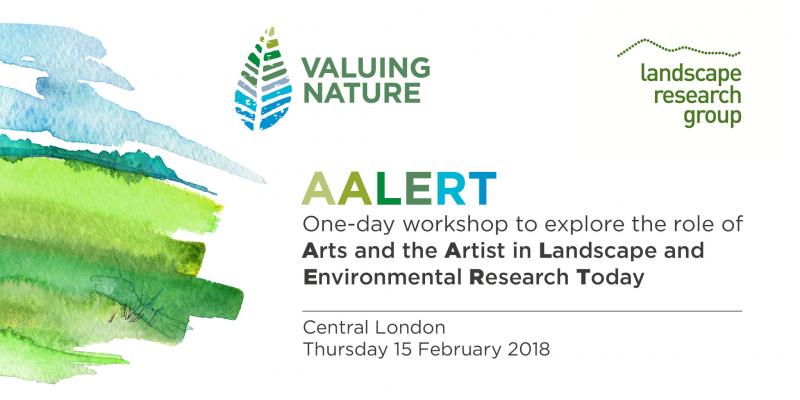
15 February 2018, Central London
AALERT is an interdisciplinary meeting aiming to foster debate and dialogue about the role of arts and the artist in landscape and environmental research today by cutting across disciplinary perspectives and professional practices.
Jointly sponsored by the Valuing Nature Programme and Landscape Research Group, and supported by the Landscape & Arts Network the workshop will explore and re-consider the contribution of the arts in shaping knowledge and communicating meaning in new interdisciplinary contexts of research around landscapes, the environment and ‘valuing nature’ agendas.
Background
The visual, performing and literary arts play an important and evolving role in shaping experiences and appreciations of landscapes as well as providing critical and cultural understanding of them. In recent years, the significance of the arts in landscape and environmental research has been increasingly emphasised, with arts and humanities components now a common, if not required, element in research proposals, such as activities delivered through the Valuing Nature research programme. Similarly, many and diverse landscape management projects with arts-based elements are funded by public money.
Despite this increasingly important role for the arts, there remains often a disconnect between epistemic communities from the arts on one side and the sciences and social sciences on the other. This dichotomy has been a recurrent subject of discussion within landscape/seascape, environmental and valuing nature research arenas, where social science dialogues are increasingly set alongside and integrating with natural science and economic perspectives. However, there is much less understanding about the contribution that can come from the arts and humanities. Considerable potential exists for developing and deepening critical reflections around the role and importance of the arts in landscape and environmental research more generally.
This workshop will therefore engage actors from different traditions who share an interest in environmental research and the arts. Bringing together a broad range of perspectives, including anthropologists, artists, designers, landscape policy-makers and managers, ecologists, geographers, philosophers, and social scientists, the event will critically reflect on emerging interdisciplinary and transdisciplinary ideas about the contribution of the arts and the role of the artist in landscape, environmental and valuing nature research agendas.
Situating these contributions in long established relationships between artistic, philosophical and expert practices, the event will specifically focus on exploring:
- The agency of the artist: What grants the artist access to meanings that scientists cannot access or communicate? How does the artist become an agent in creating (not just eliciting) value (s)? How do new interdisciplinary fora for landscape and environmental research today reinforce, elaborate or challenge prevailing norms and wisdoms, and deeper traditions, about the role and contributions of the artist in research?
- Distinguishing the arts within research: What distinguishes the contribution of the arts within interdisciplinary research in terms of advancing critical and creative research practice? How do outcomes of art-based research become credible evidence for shaping knowledges and interrogating practices around landscape and environment issues? How does this contribution relate to wider issues of research excellence as well as broader policy and practice contexts?
- Embedding the arts in research process: How should the contributions of the arts and the artist be best enabled and supported in the practical design and execution of research processes that seek to straddle and integrate knowledge, evidence and understanding across diverse disciplinary boundaries? What factors in research design, problem framing and knowledge exchange need to be accounted to animate, rather than diminish, the contribution of the arts to interdisciplinary research today?
Outcomes
The outcome of the workshop will be a cutting-edge assessment of the current situation and future prospects including recommendations for future research and engagement. It will demystify the contribution of the arts and the artist in landscape and environment research including implications for current practice in the ‘valuing nature’ research and policy arenas and endorse collaborations between artists and ‘mainstream’ researchers. It will further advocate for artistic outputs of research to be appreciated as evidence in their own right. In this way, the event will not only offer clarity to theoretical debates on the role of arts and the artist in landscape research, but will also provide answers to questions that have plagued commissioning bodies, artists and the research community for decades.
In addition the event aims to produce and disseminate new resources (academic publications as well policy and practice notes) on the role of arts in landscape and environmental research, encourage the exchange of ideas and communications between art, research, policy and practice networks and promote collaborations for publications and research proposal applications.
Organisation Team
The event is organised by an interdisciplinary team of academics and artists:
Dr Eirini Saratsi – University of Reading/Landscape Research Group,
Dr Tim Acott – University of Greenwich/WetlandLIFE project;
Ewan Allinson – Landscape & Arts Network;
Dr Nicola Beaumont – Plymouth Marine Laboratory/CoastWeb project;
Prof Tim Collins – Collins and Goto studio/Landscape Research Group;
Dr David Edwards – Forest Research; and
Dr Rob Fish – University of Kent/Valuing Nature Programme.
Participation
For further information about this event please email: [email protected]
